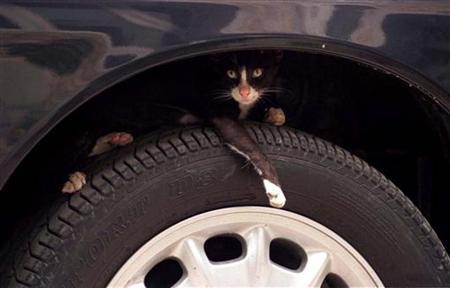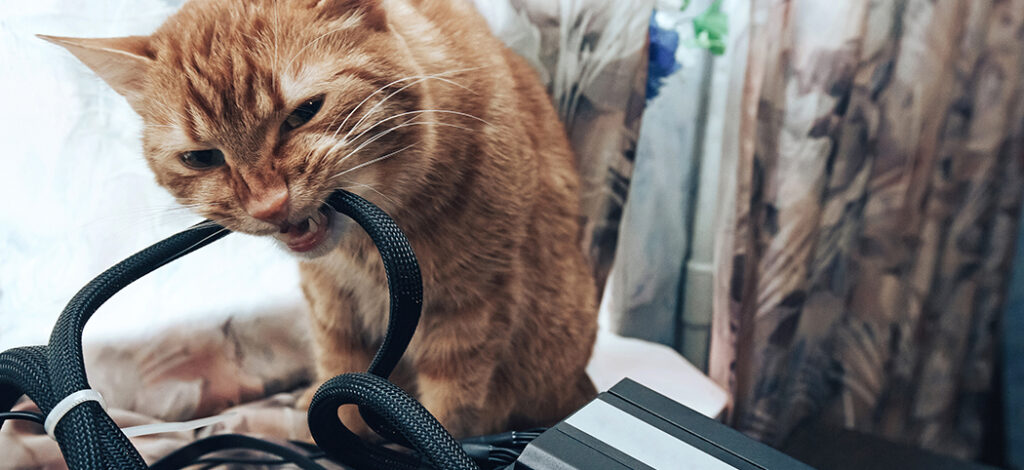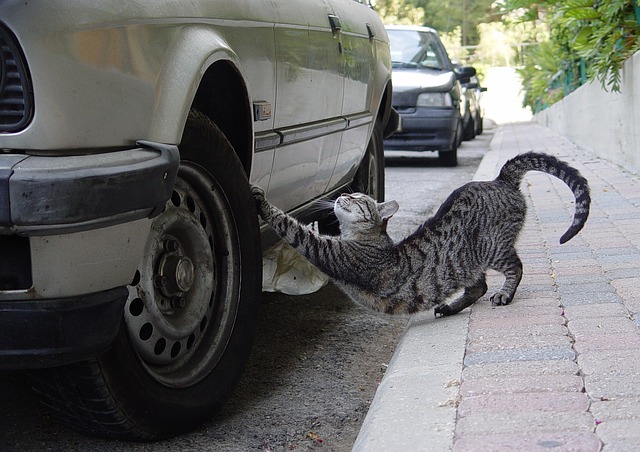Reduce, reuse, recycle – almost everyone wants to live by these rules in a bid to save the environment. And that’s great as long as you are using safe material.
In the DIY community, used tires are increasingly becoming popular as a material for making useful household products.
From building outdoor staircases and wall barriers to making furniture and castles, used tires seem to have unlimited décor applications.
But before you get your creative juices running on your latest used-tire product, you may want to consider an important question: how safe are used tires for your cat?
In this post, we will seek to answer this question, so keep reading to find out!
Are Tires Toxic To Cats?

Recycled tires are typically used in three distinct forms:
- Worn out tires that are used as they are
- Rubber shreds which are used with a binder in construction
- Tiles that are manufactured by companies that shred old tires and combine them with other material
Whichever form you use tires, they can be toxic for your cat because they are made up of toxic metals, voltaic compounds, and other carcinogenic compounds.
In addition, studies have shown that the toxic substances in tires are water-soluble which means they can easily leach into water and affect your drinking water.
It is, therefore, advisable to dispose of your old tires as a hazardous waste instead of trying to repurpose them into furniture or any other creation.
Toxins in Tires That Can Harm Your Kitty

As we have already pointed out, tires contain toxins.
To understand why used tires are considered toxic to cats, let’s have a closer look at the toxic components of tires below.
1. Metals
Tires contain at least 15 metals but studies have shown that Zinc and Iron constitute a bigger percentage and are naturally released more easily into the environment than the other metals.
Manganese is the third most abundant metal followed by Barium and Lead.
Even though heavy metal poisoning in cats is not very common, it is still possible, especially with metals like Zinc and lead.
The toxic metals can enter your cat’s body through absorption by their skin and this can result in serious health issues.
For starters, your cat’s immune system may be adversely affected resulting in allergies, cancer, or autoimmune disorders.
The endocrine and neurological systems could also be affected by metal poisoning, which could result in issues with the circulatory system and cognitive issues respectively.
2. Volatile Organic Compounds
In addition to metals, used tires are also known to release Volatile Organic Compounds (VOCs) into the environment.
There are at least 20 VOCs that are released by tires and they can be classified into three broad categories:
- Aromatic nitrogen-containing compounds,
- Polycyclic aromatic hydrocarbon compounds
- Total petroleum hydrocarbons.
Most of the VOCs in the tires come from the petroleum oils that are used in the manufacture of the tires.
Old tires are also known to have at least 14 Semi-Volatile Organic Compounds (SVOCs) that could potentially be released into the environment.
SVOCs are a subgroup of volatile organic compounds with a higher boiling point and a higher molecular weight.
Examples of SVOCs found in tires include benzothiazoles which are used to accelerate the process of vulcanization when manufacturing the tires.
Other SVOCs include aniline, phenoxazine, phenol, 4-phenol, and 2(3H)-benzothiazole.
However, experts believe that only new tires release VOCs or SVOCs into the environment. This means that by the time they are retired and repurposed for décor and other DIY projects, the VOC levels are negligible and will not cause any serious harm to the environment or your cat.
Do Tires Release Toxic Fumes?
Wondering if that new tire smell is toxic? Well, tires are made up of lots of compounds that are constituent to the smell and most of these compounds are toxic.
However, the toxicity of the fumes will depend on the quantities. For instance, occupational exposure might result in some health issues.
However, there is no evidence that the fumes from one or two tires – especially used tires can expose you or your cat to harmful fumes.
However, the burning of tires will release toxic fumes at dangerous levels. According to the EPA you shouldn’t burn or be near a burning tire because the fumes emitted are harmful.
Some of the fumes that result from burning tires include sulfur oxide, carbon monoxide, nitrogen oxide, and particulates. These fumes can lead to long-term as well as short-term ailments for both you and your pet.
What Happens If My Cat Chews Or Ingests Tire Materials?

Many kittens are attracted to rubber and may chew on anything, especially when teething.
There are also cats that may find something tasty in rubber and may be inclined to chew any item within their reach, including tires. If this describes your kitty, should you be worried?
Well, if your kitty ingests tire materials or licks residue from tire treading surfaces, she may experience a wide range of health issues.
As aforementioned, rubber contains many toxic metals, voltaic compounds, and other carcinogenic compounds, all of which can be detrimental to your kitty’s health.
Well, ingesting small amounts of rubber materials is not likely to cause any issues to your cat, but ingesting copious amounts could be dangerous.
Additionally, rubber can cause blockages in your kitty’s digestive system. If she swallows enough pieces, the materials can get tangled up in her intestine, causing her severe pain and even cause death by puncturing her intestines.
That said, don’t panic if you stumbled upon your cat chewing tires—she isn’t going to drop down dead! As long as she has not ingested large amounts of tire rubber, she will likely be fine.
But to be extra safe, get in touch with a vet immediately so that he can advise you on the next course of action.
My Cat Loves Chewing On Tires: What Should I Do?

If your kitty loves chewing on tires, you may be reluctant to discourage her from the behavior. After all, we all love to see our fur babies happy, and it is understandable.
However, it is important to understand that our feline friends don’t know what is good or healthy for them, and if we left them to do whatever pleases them all the time, they could end up with short life spans!
The best thing to do is to try to replicate her chewing experience in a more responsible way.
There are tons of chew toys that have been designed to replace the chewing experience—all without the toxins and intestinal blockage risks associated with tires! Get your feline friend a few of these chew toys.
Most of the toys are small enough for your kitty to carry around, yet big enough to prevent choking.
For teething kittens, check out this post for the best options: 18 Best Kitten Teething Toys
How to Safely Dispose Of Used Tires
Because tires are considered toxic, you should dispose of them safely.
Do not throw them in landfills or try to incinerate them as that will cause more harm to the environment.
Also, burying them will not help because they are not biodegradable. A buried tire will only release the toxic substances into the soil and eventually contaminate the groundwater.
The best way to dispose of used tires is to take them to your local recycling center.
In fact, some recycling centers will come to pick up the tires if you call them.
Alternatively, you can get in touch with your local auto shop. There is a good chance they recycle tires or they have a partnership with an organization that does.
Parting Thoughts
Making a shelter for feral cats with your old tires might seem like a noble gesture. Or using old tires to make a staircase or some other décor item might look like the perfect way of adding curb appeal.
But this might do more harm than good. Not only can the components of the tires cause health issues for your feline friend but it could also affect your drinking water as well as aquatic life.
This is because the toxins in the tire are water-soluble and will easily leach into the water through the soil.
For these reasons, it is best to dispose of your old tires responsibly. Do this by calling your local recycling center or liaising with a nearby auto shop dealer to have the tires recycled.

Hi! I am Eleanor Price. I started this website after my cat, Louie, almost died from a case of botulism (a type of food poisoning often caused by bacteria that grow on food items). Turned out that my cat’s diet was the problem. I have made it my duty to provide the best information and recommendations about everything cat lovers need to know about their felines’ health and wellbeing. My goal is to find the most informative content on anything feline-related and share it with fellow hardworking kitty lovers.

